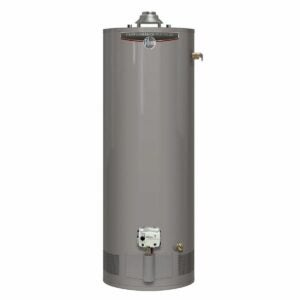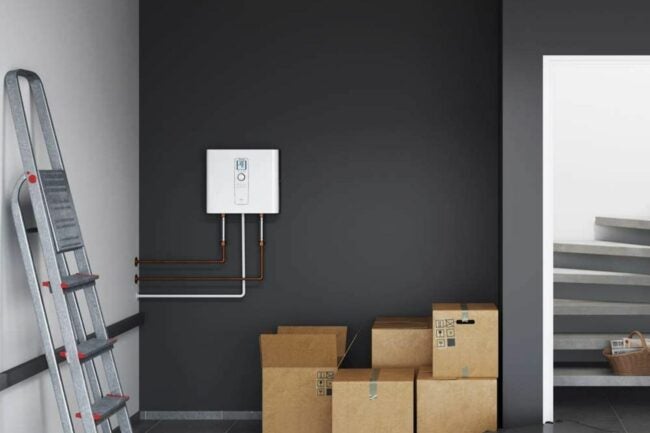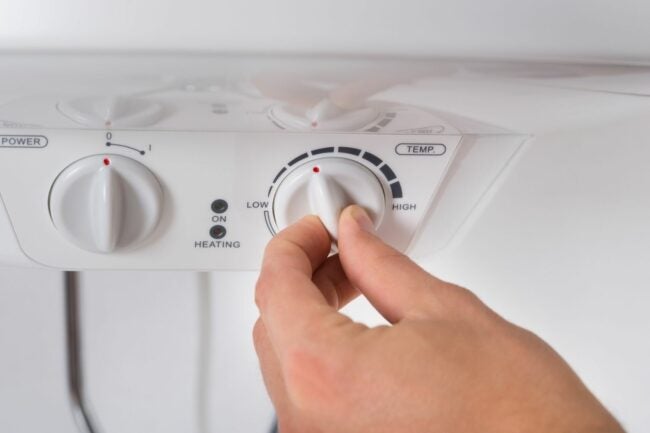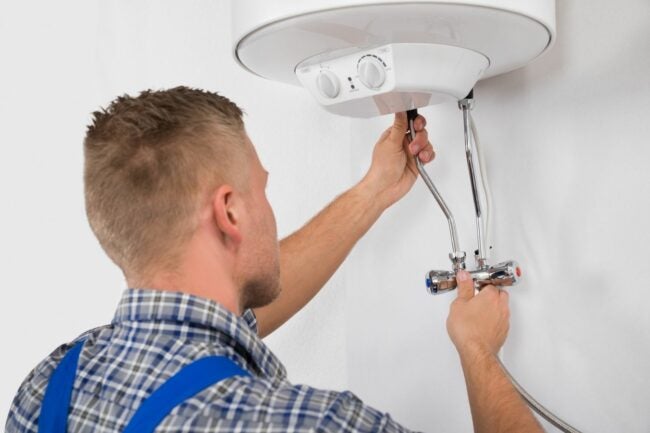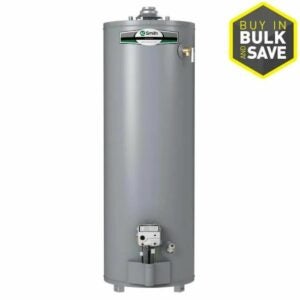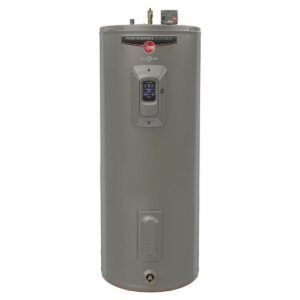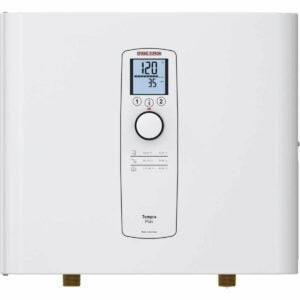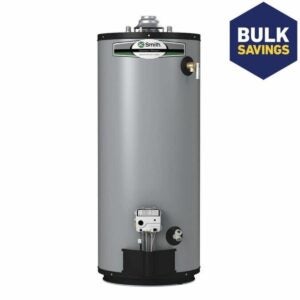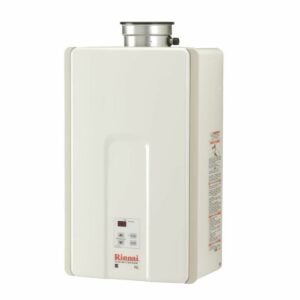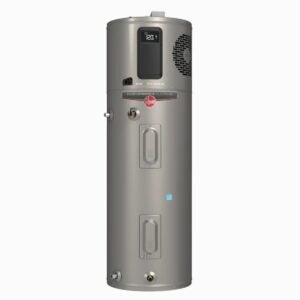It used to be that there weren’t many options when it came to purchasing a hot water heater. The only two choices were gas or electric. With the advent of new technologies, the hot water heater landscape has changed, with more options on the market than ever.
In addition to gas and electric tank water heaters, buyers can also consider tankless and hybrid water heaters. All these options might make you feel like you’re in deep water when it comes to making the right decision. Read on to learn about the features to consider when determining the best hot water heater for your home.
- BEST OVERALL: Rheem Performance Platinum 50 Gal Natural Gas Heater
- BEST BANG FOR THE BUCK: A.O. Smith Signature 40-Gallon Natural Gas Heater
- ELECTRIC TANK PICK: Rheem Gladiator 50 Gal. Electric Water Heater
- ELECTRIC TANKLESS PICK: Stiebel Eltron Tankless Water Heater, Electric
- GAS TANK PICK: A.O. Smith Signature Premier Natural Gas Heater
- GAS TANKLESS PICK: Rinnai High Efficiency Natural Gas Tankless Heater
- HEAT PUMP HYBRID PICK: Rheem Performance Platinum Hybrid Electric Heater
Popular Types of Water Heaters
Shoppers have four hot water heater options to consider. These units range from old-school tank water heaters to the newer hybrid models. Each offers advantages to consider.
Storage Tank Water Heater
Storage tank water heaters are the most common type. They consist of an insulated tank with electric or natural gas power for heating. Gas units use a flame burner or electrically powered heat coils to warm the water to a temperature regulated by a thermostat. The water is kept at a preset temperature in the tank day and night, standing by until needed. Once the tank’s hot water supply runs out, family members must wait for the heater to reheat the tank, which can take up to an hour.
Tankless (On-Demand) Water Heater
Tankless hot water heaters work on an entirely different principle than the traditional storage tank water heater. Rather than continually heating water in a tank, tankless water heaters operate on demand. This means they don’t start heating water until someone needs it.
As with conventional water heaters, tankless water heaters use gas or electricity to heat water.
When a hot water tap is opened, cold water enters the tankless heater via a pipe and then is heated quickly by a gas burner or electric coil. Unlike a tank water heater, a tankless water heater offers an endless supply of hot water.
Tankless water heaters do, however, have their limitations on speed and flow. Most can produce about 5 or 6 gallons of hot water per minute.
Heat Pump (Hybrid) Water Heater
Heat pump water heaters, also known as hybrid water heaters, work off the concept that it’s easier (and cheaper) to use existing heat than it is to create heat. Heat pump water heaters take the heat from the air and use it to warm water. Like a refrigerator uses a compressor to expel hot air from its insulated interior, a heat pump water heater compresses the surrounding air, expelling the cool air and retaining the warm air to heat water. It’s called a hybrid because it uses electrical coils to heat the water when hot water consumption is high. Because it gathers heat from the air, a hybrid water heater works most efficiently in warm climates.
What to Consider When Buying a Water Heater
While knowing the different types of water heaters and their advantages is important, it also helps to know the main factors or features to consider when determining the best hot water heater for your needs.
Gas vs. Electric
The big difference between gas and electric is cost. Expect to pay, on average, between $1,300 and $2,600, including installation fees, for a 40-gallon gas water heater versus $950 to $1,500 for the same-size electric water heater, as reported to Fixr, a network of contractors and home improvement professionals.
Although operating costs fluctuate with gas and electricity rates, gas is significantly cheaper than electric to run. Gas hot water heaters cost around $30 a month to operate while electric heaters will run about $42 a month, according to Fixr.
Venting Needs
Because electric water heaters don’t require vents, they can be installed in almost any location in the home. Gas hot water heaters produce carbon monoxide exhaust gases and moisture when they burn. They use a ventilation system that consists of pipes and ducts to remove these byproducts. Thus, gas heaters need venting and take up more space than electric heaters, limiting their placement in a home.
Sizing and Capacity
Hot water heaters come in capacities ranging from 20 to 100 gallons. The larger the capacity, the more hot water you can use before the supply runs out and a waiting game for more hot water begins. A 40- to 50-gallon tank is sufficient to handle a household of four people. Add 10 gallons of capacity for each additional person.
The higher the capacity, the larger the hot water heater. It’s essential to determine how much space is available in a basement or utility closet when selecting a new hot water heater. Gas and electric hot water heaters come in tall models (which are 50 to 76 inches tall and 18 to 21 inches in diameter) and short models (which are between 30 and 49 inches tall and 20 to 26 inches in diameter). Also, note that gas hot water heaters take up more space because of the venting pipes and ducts they require.
If you’re tight on space, consider the much more compact tankless water heaters. Since tankless water heaters don’t have the water storage capacity of conventional tank heaters, they have their limitations. A typical tankless water heater provides hot water at a rate of 2 to 5 gallons per minute, which can limit the flow of hot water into the home, especially if multiple taps or appliances are using hot water at the same time.
Multiple tankless water heaters can work in tandem to improve the total hot water capacity a home needs. A separate tankless heater can serve specific appliances such as a washing machine.
Efficiency Rating
All water heaters have efficiency ratings, which indicate how much of the energy used by the unit actually heats the water. A water heater with an efficiency rating of .70 means that 70 percent of the energy consumed by the water heater goes toward heating water.
This rating isn’t a great indication of how much you can expect to spend on the unit, given the difference in gas and electricity rates. For example, a gas unit will have a much lower efficiency rating than an electric water heater, but because gas is significantly cheaper, running a gas tank heater will cost considerably less than running an electric water heater.
Tankless water heaters cost significantly less than storage tank heaters because they aren’t always running to keep a water supply warm. Depending on a home’s hot water usage, a tankless system can save as much as 40 percent off an energy bill. It’s often better to look at the estimated annual cost of operating the water heater to determine how it will affect the budget.
Brass vs. Plastic Drain Valves
Tank water heaters have a valve at the bottom of the tank used to drain the tank for maintenance. These valves work with a standard garden hose and are made of brass or PVC (Polyvinyl chloride). Since brass is far more durable than plastic, the better choice is a hot water heater that uses a brass drain valve.
Digital Displays
Like other major utility systems in a home, newer water heaters come with digital controls that allow owners to program the water heater to shut off at different times, such as when the family is away on vacation. While a digital display might add to the unit’s initial cost, it improves the efficiency of the water heater, ultimately saving money.
Our Top Picks
Read on to review these recommendations for hot water heaters in several categories. This list includes some of the most efficient and technologically advanced units from reputable hot water heater manufacturers.
Photo: amazon.com
From a respected name in water heaters comes the Rheem Performance Platinum 50 Gal. Tall Natural Gas Water Heater. This tank water heater offers excellent all-around performance and efficiency. Its 50-gallon capacity provides plenty of water for a family of five without breaking the bank. With its powerful 40,000 BTU gas burner, the Performance Platinum can deliver a staggering 77 gallons of hot water in the first hour. Despite this high output, it’s rated to set owners back less than $300 a year, on average, in energy costs.
Photo: amazon.com
Priced hundreds of dollars less than similarly equipped hot water heaters, the A.O. Smith Signature offers tremendous value. It features a 40-gallon tank heated by a powerful 34,000 BTU burner, enabling it to deliver up to 66 gallons of hot water in the first hour. This makes it powerful enough to serve a household of three or four. It’s also energy efficient. Features include an electronic gas valve for precise thermostat control, an LED indicator that provides system information, and an integrated safety system that prevents accidental fires.
Photo: amazon.com
There’s a lot packed into Rheem’s Gladiator 50 Gal. 5500 Watt Electric Hot Water Heater. First, its 50-gallon capacity can provide hot water for a household of four. And though this electric unit lacks the energy efficiency of a gas water heater, it includes some excellent features designed to improve efficiency. Its built-in Wi-Fi controls allow for remote temperature adjustment and alerts in the event of a leak or malfunction. It also includes a vacation mode to save money while the family is away. An auto shut-off valve protects the home from water damage in the event of a leak.
Photo: amazon.com
Users can avoid the fear of cold showers with the Stiebel Eltron Tankless Tempra 24 Plus. In addition to supplying a steady flow of hot water, the Stiebel Eltron Tempra 24 Plus includes several features that make it rank among the top tankless water heaters. When hot water demand begins to exceed capacity, the Stiebel Eltron Tempra 24 Plus automatically makes slight reductions to flow to ensure the warm water keeps on coming. It will provide up to 5 gallons of hot water per minute and can save you money. The Tempra uses about 15 to 20 percent less energy than standard tank water heaters. Other attractive features include easy-to-use digital controls for output and water temperature. The unit is small, weighing in at just over 15 pounds, and takes up very little space with its 20- by 20-inch profile.
Photo: amazon.com
Families can keep the hot water flowing for years to come with the A.O. Smith Signature Premier 40-Gallon gas tank hot water heater that features a 12-year warranty and plenty of water-heating power. It boasts a 40,000 BTU burner, which delivers 65 gallons of hot water in the first hour. That’s plenty to provide hot water for a household of four people. Other features include intuitive electronic temperature controls and an LED system status indicator. This tank water heater will fit into more compact spaces than some, measuring just 51.5 inches tall and 22 inches in diameter. Durability is always an issue when it comes to hot water heaters. A.O. Smith equips this unit with features to extend its life, including a ceramic-fused tank shield that prevents corrosion and a self-cleaning dip tube that reduces sediment buildup inside the tank.
Photo: amazon.com
Combine tankless water heater efficiency with gas power to slash energy use by up to 40 percent with the Rinnai High Efficiency 6.5 GPM tankless gas water heater. This high-efficiency unit pumps out up to 6.5 gallons per minute of hot water. Rinnai also minimizes the number of pipes needed for venting the gas burner with a concentric venting system, which allows intake and exhaust to run through the same vent. Another included feature is a temperature lock to prevent accidental thermostat changes. At a little over 1 foot wide and 2 feet tall, this tankless water heater doesn’t take up much room, making it ideal for smaller spaces.
Photo: amazon.com
Take energy efficiency to the next level with the Rheem Performance Platinum 50 Gal. 10-year Hybrid Electric Water Heater. This Energy Star-rated unit will save nearly $500 per year in energy costs compared to standard tank electric hot water heaters. Couple that with a 10-year warranty, and this unit offers exceptional savings. Although the upfront cost is expensive, it will earn back that difference in just a couple of years. This hybrid produces enough water to serve households of up to five people. It’s also a smart water heater, so owners can track usage and manage the water heater’s operation via a smartphone. The Rheem hybrid water heater has an integrated self-cleaning function that reduces sediment, extending the life of the water heater.
FAQs About Water Heaters
An old hot water heater is like a ticking time bomb. It sits for many years in your basement or utility closet, dutifully providing your family with hot water until, without warning, it stops working, creating an unexpected inconvenience and expense. Although a broken water heater might feel as shocking as an ice-cold shower, there are a few warning signs to watch for.
Q. How long does a hot water heater last?
On average, a gas, an electric, or a hybrid tank hot water heater will last between eight and 12 years. Tankless water heaters can last as many as 20 years.
Q. What are the signs your hot water heater is going out?
There are telltale signs of a failing water heater, including banging noises inside the tank, a decline in water temperature, rust-colored water, and water pooling around the tank’s base.
Q. Can you still shower if your water heater is leaking?
A leaking water heater will not prevent you from taking a warm shower. If the leak is bad enough that you need to shut off the water heater, you can still shower. You just won’t have any hot water.
Q. Can a leaking water heater explode?
Though a rare occurrence, a water heater can indeed explode and in spectacular fashion. This occurs with gas or electric water heaters that have clogged or malfunctioning pressure relief valves. If too much pressure builds, the water heater will explode, literally launching the unit like a rocket.
Q. How much does it cost to replace a hot water heater?
A water heater installation costs between about $804 and $1,547, which includes the price of the water heater plus labor, according to HomeAdvisor, a network of contractors and home improvement professionals. Tankless heaters, which are significantly more expensive than tank heaters, are on the high end of this range.
